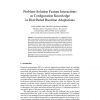Free Online Productivity Tools
i2Speak
i2Symbol
i2OCR
iTex2Img
iWeb2Print
iWeb2Shot
i2Type
iPdf2Split
iPdf2Merge
i2Bopomofo
i2Arabic
i2Style
i2Image
i2PDF
iLatex2Rtf
Sci2ools
123
click to vote
FIW
2009
2009
Problem-Solution Feature Interactions as Configuration Knowledge in Distributed Runtime Adaptations
Abstract. Current generative programming approaches use configuration knowledge to automatically manufacture an end product given a particular requirements specification. Such configuration knowledge models feature interactions either in the problem domain (at the requirements level) or in the solution domain (at the implementation level). Thus, feature interactions are defined as a composition problem in one specific phase of the generative programming lifecycle. However, we experienced the need to model and handle feature interactions that cross the problem and solution domain. This paper presents a specific case study, in the context of our work on distributed runtime adaptation, motivating this important but often ignored category of problem-solution feature interactions. Keywords. Generative programming, configuration knowledge, feature interactions, distributed runtime adaptation, DyReS
| Added | 17 Feb 2011 |
| Updated | 17 Feb 2011 |
| Type | Journal |
| Year | 2009 |
| Where | FIW |
| Authors | Frans Sanen, Eddy Truyen, Wouter Joosen |
Comments (0)

